Have you noticed your clothes getting a little more snug as you age? It’s not your imagination. Many women gain weight in menopause, even those who’ve never struggled with their weight. Learn nine natural remedies to lose weight or avoid weight gain during menopause. You’ll feel better, and you may be able to lower the severity and duration of menopause symptoms.
Why do women+ gain weight during the menopause journey?
Weight gain and a slowing metabolism
Perimenopause weight gain
The average woman+ gains 4.5 pounds
during the menopause transition (40-55), according to the SWAN study.
Then, when you're in your 50s and 60s, it's common to add an additional 1.5 pounds per year, according to the Healthy Women's Study.
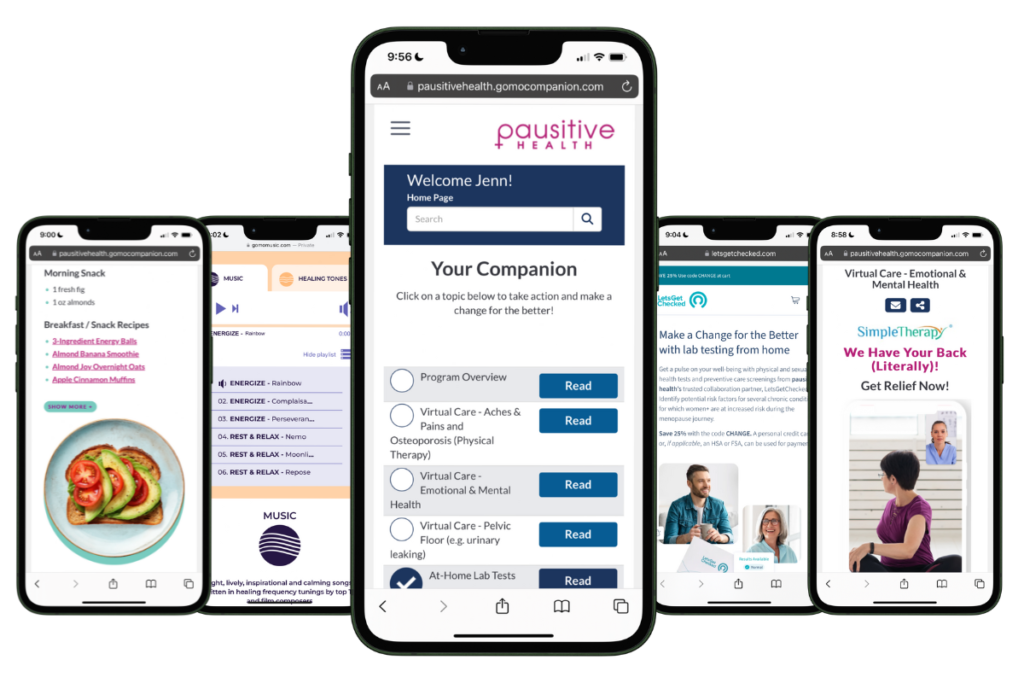
Free Support
For A Limited Time!
pausitive health offers personalized support for every stage of the menopause journey. Customize your experience with 14 evidence-based educational tracks, a diet assessment with recommendations and a food library, solutions for aches and pains, virtual care options, practical lifestyle supports, and a supportive community. All in one trusted place.
Join the pilot and be the first to know when our web-app is coming in 2026!
Obesity concerns during the menopause journey
During the menopause journey, it is common for any weight gained to tend to accumulate in a person’s midsection. It may also be more likely that fat accumulates internally around your organs (vs. right under the skin that you can check when you pinch your skin).
This internal (visceral) fat increases inflammation in the body, which in turn increases the risk of cardiovascular disease (hypertension, heart disease, stroke) and metabolic conditions like type 2 diabetes.
Should you use BMI?
BMI is a common calculation based on your height and weight, which is categorized and commonly used as a measure of obesity. It ranges from being underweight to being obese.
| BMI | Weight Status |
|---|---|
| Below 18.5 | Underweight |
| 18.5 - 24.9 | Healthy Weight |
| 25.0 - 29.9 | Overweight |
| 30.0 and Above | Obesity |
This calculator from the CDC will generate a BMI for you.
However, BMI does not take into account factors like:
- age
- body habitus (shape)
- body composition
And, according to the CDC, BMI (body mass index) screens for weight categories that may lead to health problems, but it “does not directly measure body fat.”
So, for example, you may find an individual who is very muscular with a BMI that would put them into the overweight or obese category when, in fact, they are not. Additionally, BMI can vary depending on one’s race and across ethnicities within a given racial group.
While BMI is an easy calculation to make, other measures appear to reflect body composition better and provide greater insight with a tighter relationship to health status and potential future health events.
Waist-to-hip ratio (WHR)
One of these is waist-to-hip ratio (WHR). WHR is the circumference of the waist divided by the circumference of the hips and is used as a quick measure of fat distribution.
Recent studies have found WHR to be:
- a more accurate indicator of risk of mortality from all causes
- more useful tool in determining health risks and mapping healthcare interventions
Therefore, when you speak with your healthcare practitioner it’s important to discuss these measures (and others such as skinfold measurements, DXA, or bioimpedance) depending on your particular situation.
What do I do if I’m gaining weight?
If you’re gaining weight, and perhaps for the first time in your life, talk to your doctor about the best approach.
You’re probably looking for weight loss techniques like the latest diet trend – Keto, Whole 30, or Atkins.
While they’re trendy, we don’t recommend them. Many of these approaches eliminate foods or bulk up on others in a way many do not find sustainable or maybe unhealthy long-term. Instead, focus on a balanced approach with moderation as your North Star.
- Eat healthy. Choose a diet low in saturated fat and high in fruits and vegetables.
- Eat less. For example, eat an appetizer instead of an entrée.
- Watch your calories.
- Get enough sleep.
- Don’t eat 3-4 hours before you go to bed.
- Drink more water.
- Manage stress.
- Talk to your doctor.
Let’s dig into each one, so you know the types of healthy foods to eat, how to manage stress, how much sleep you need, and more.
Healthy eating in menopause
- Lower your saturated fat intake and eliminate trans fats.
- Increase vegetables, fiber, and Omega-3s.
- Eat plant-based foods.
- Try the Mediterranean diet (fruits, vegetables, healthy fats, and some red wine).
- Try the MIND diet (combination of the Mediterranean and blood pressuring lowering DASH diet).
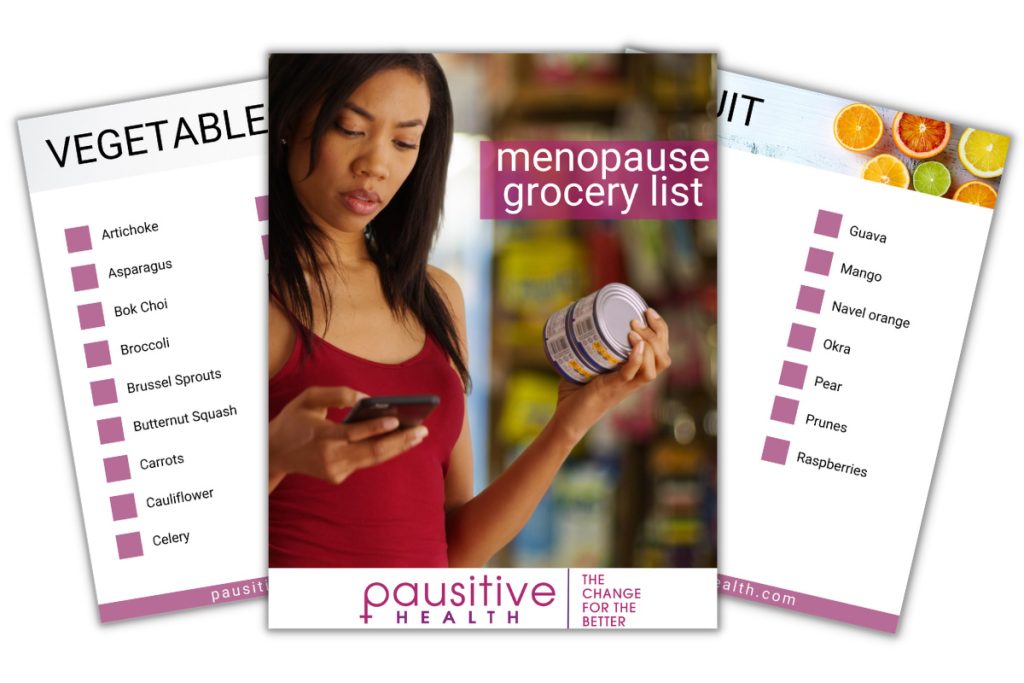
Make A Change For The Better!
This menopause grocery list contains a combination of foods specifically selected to help you feel better today and even better in the future.
"*" indicates required fields
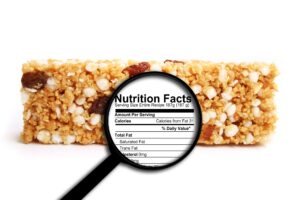 Portion control
Portion control
You can watch what you eat, by lowering the fat content and increasing vegetables and fiber, but weight loss also requires portion control. Eating smaller portions is harder than ever, as serving sizes have drastically increased over the years.
-
Fist: Vegetables and fruit
-
Scooped handful: Grains
-
Palm: Meat
-
Thumb: Peanut butter or cheese.
-
Fingertip: Fat like butter.
Now, look at your hand? How often are you eating the right amount?
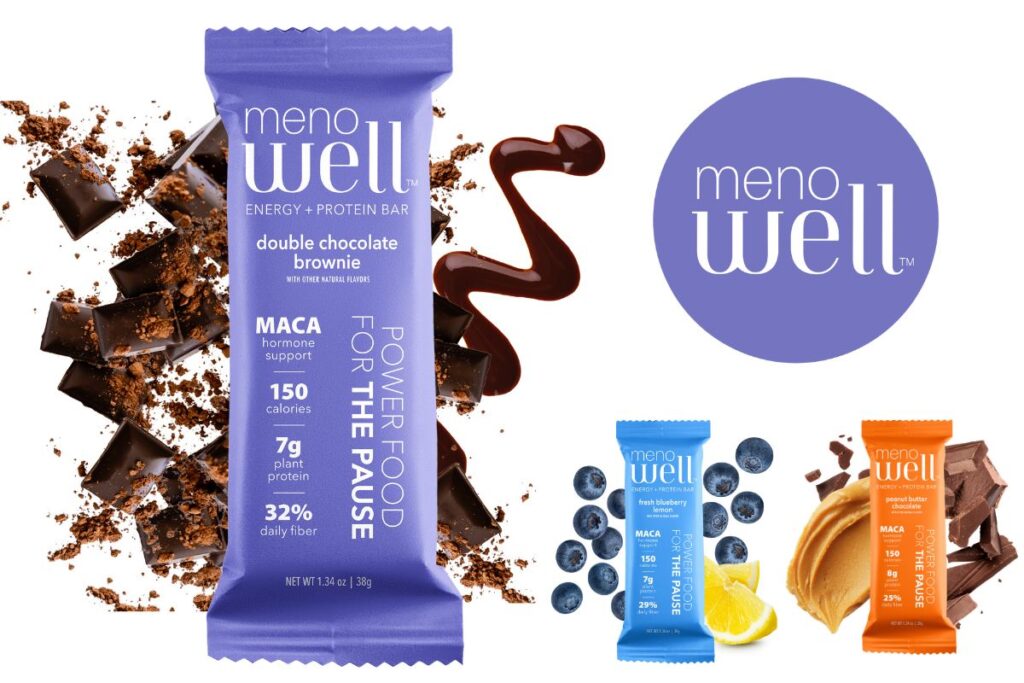
Boost Energy & Banish Cravings
Save 10% off MenoWell Menobars
Amp up your nutrition with these energy and protein bars! They provide many of the things important to eat during your menopause journey – protein, fiber, and gut-supporting prebiotics. The bars are vegan, gluten-free, dairy-free, low-carb, and low in added sugars.
Control your cravings and help manage your weight with these convenient bars that come in flavors like the best-selling Double Chocolate Brownie.
This is an affiliate link. We may earn a small commission if you access these services. The companies we work with are carefully vetted. However, we do not guarantee their products or services.
1200-calorie menopause diet
A 1200-calorie diet is a general rule for someone looking to lose weight.
Eating 1200 calories a day
Stay consistent
Consistency is key, yet it’s the hardest thing to do when trying to lose weight or stick with a 1200-calorie diet.
Be inspired by success stories
There are also resources like the National Weight Control Registry. It’s a review of 10,000 people who successfully kept large amounts of weight off for an extended period.
- 78% ate breakfast every day.
- 75% weighed themselves at least once a week.
- 62% watched less than 10 hours of TV per week.
- 90% exercise, on average, about 1 hour per day.
Women+ who slept 5 hours or less a night gained weight
Sleep and weight gain
People who sleep less also tend to eat more due to increased appetite driven by hormonal changes – lower levels of leptin (stimulates feelings of satiety) and higher levels of ghrelin (stimulates the appetite and promotes fat storage).
But, sleep can be difficult starting in perimenopause.
59% percent of women in our pausitive health survey had trouble sleeping.
First, identify the causes of your sleep disruption. Don’t just blame menopause. Look at all causes.
Then, establish a strong sleep hygiene routine, one that focuses on day and night sleep habits such as:
- Relaxing before bed to signal to your body that it is bedtime.
- Avoid caffeine after noon.
- Don’t drink alcohol late at night.
- Avoid a heavy meal before bedtime as well as snacking into the night
- Sleep in a darkened room (or use a sleep mask) on a good-quality mattress.
- Lower the temperature (66 – 68 degrees).
- Stop using technology (cell phone, computer, TV, iPad, etc.) several hours before bed.
- Avoid exercise several hours before bedtime.
- Using binaural beats.
- Trying cognitive behavioral therapy.
While some people take medication to help with sleep, it is not a long-term solution and can result in dangerous side effects.
Is it bad to eat before bed?
Yes, it’s bad to eat before bed.
Eating late at night or right before you go to bed increases the likelihood of weight gain and reduces the likelihood of getting a good night’s sleep, which also increases the likelihood of putting on the pounds.
It also increases the chance you will experience GI reflux, especially if you are prone to those symptoms.
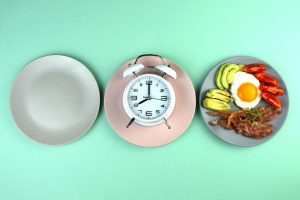 Time-restricted feeding
Time-restricted feeding
Some researchers believe when you restrict eating to certain times of the day, you can lose weight more easily, maintain a healthy diet, and prevent certain illnesses or manage them easier.
Time-restricted feeding is a theory that your body is not designed to process food all day. So, you eat all your food in a 10 to 12-hour timeframe or go 12-14 hours between your last meal of the day and the first meal the day.
You can adjust the times you don’t eat based on your sleeping schedule, but the concept is simple to follow.
Drink more water
Water has many benefits, including make you feel full so you eat less. While you don’t want to feel bloated.
While you don’t want to feel bloated and perhaps already do in menopause, there are more benefits than downsides. Sometimes feelings of hunger can reflect a state of dehydration. Water flushes out your body and aids in digestion.
Also, if you remove high-calorie drinks like soda, sports drinks, or sweetened coffee and drink water instead, you’re lowering your calorie intake.
Aim for 8-12 glasses of water a day unless you have a health condition where your fluid intake must be restricted.
Water is a simple step you can take to keep the weight off and reduce symptoms like hot flashes and night sweats. Take small steps. The cumulative effect will make a difference.
Physical activity during menopause
More women turned to physical activity than any other treatment for menopause symptoms in the pausitive health survey. Exercise offers a number of benefits including positively impacting your menopause journey. Women who are physically active before and during midlife and those who increase their activity level during menopause have a lower chance of gaining weight.
The amount of time in physical activity necessary to lose weight can vary, especially depending on your eating habits.
It’s recommended that you get a baseline 150 to 175 minutes of physical activity every week to maintain your weight, and to lose weight you may need to adjust your diet as well as increase activity.
The optimal combination of physical activity includes aerobic exercise, strength training/weight-bearing exercise, and movements that help promote good balance.
Also, try high-intensity interval training (HIIT) workouts. According to a University of Scranton study, obese postmenopausal women who did 10 minutes of HIIT five times a week lost twice as much weight as those focusing on endurance-based aerobic exercises like walking or swimming. Plus, they lost six inches of body mass.
In addition to the HIIT workouts, the women followed a 1200 to 1500 calorie diet. So, again, food plays a significant role in weight loss.
For most people, physical activity alone will not get you there. You need to burn more calories and eat well.
Try these exercise videos to help with menopause symptoms.
Stress management
n addition to helping you lose weight, physical activity can also help you manage stress.
Of course, menopause symptoms like hot flashes, sleeplessness, and mood swings just add to your stress.
Depending on the severity, they can make it difficult to get through the day.
Stress will affect not only your mood but also your weight.
Studies show there’s a connection between chronic stress and abdominal fat both in overweight and average weight women.
When you’re stressed, your body responds by making more cortisol. It’s often called the stress hormone. Cortisol changes fat distribution, causing your body to store it centrally in your midsection, which increases your risk of cardiovascular disease.
Increased cortisol can also increase your appetite or cravings for unhealthy food. Stress eating during menopause will make it harder to lose and maintain an optimal weight.
So, consider exercise, yoga, tai chi, and meditation. In an analysis of 9 studies, eight showed yoga, Tai Chi, and meditation-based programs improved symptoms like hot flashes in menopausal women.
Guided imagery is another stress relaxation technique that calms your mind and body.
You don’t need a lot of time to manage your stress. With mindfulness, you can get started with just five minutes a day.
Focus on your breath, and change the outlook of your day.
Also, consider what’s causing your stress. Is it more than just menopause? Do you feel overwhelmed? If so, use these strategies to calm the chaos and gain control.
As you work through your stress, whether menopause-related or not, you’ll notice your health, well-being, and happiness improve.
Committing to stress management is an investment in you. It’ll help you manage your day-to-day tasks better and help you maintain a healthy weight.
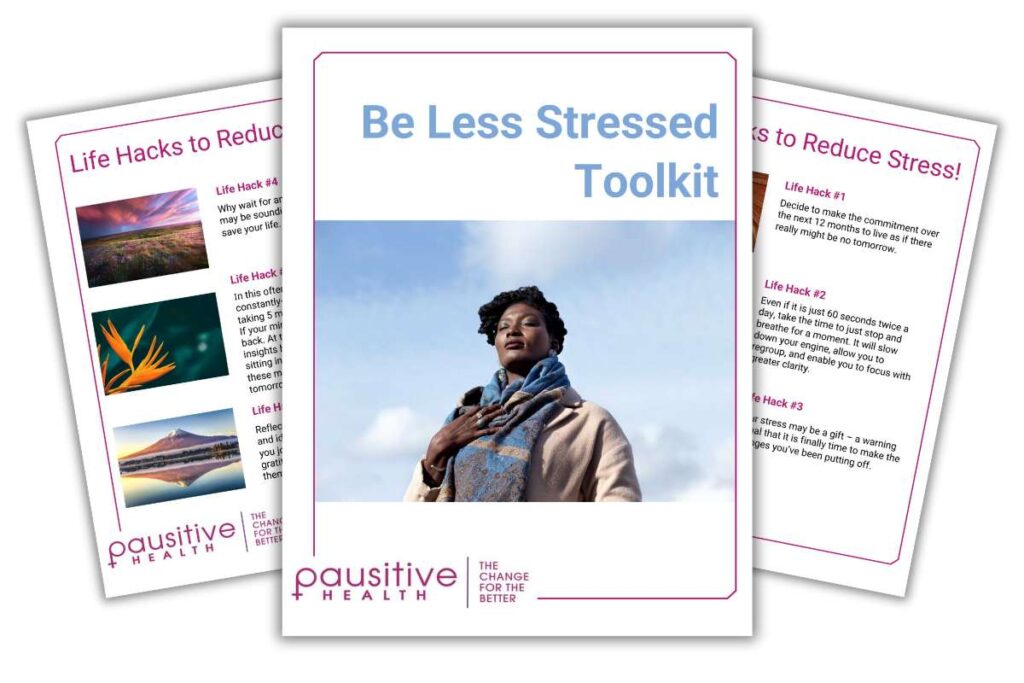
Be Less Stressed
Feeling stressed or overwhelmed? Learn life hacks to reduce stress with the Be Less Stressed toolkit.
"*" indicates required fields
Talk to your doctor
Menopause can be a time of emotional volatility, ranging from irritability and mood swings to intense and debilitating anger and rage.
Some women+ also note changes in cognition, e.g., brain “fog,” difficulty with focus and concentration, as well as feelings of loss.
Because everything is connected, emotional distress impacts your body and brain. Low energy, lack of motivation, cravings, and stress eating make it more difficult to maintain or lose weight.
Speak with your doctor, and do not hesitate to seek help from a mental health professional if your emotions and feelings become overwhelming or make it difficult to get through the day.
Many doctors do not have adequate menopause training, so you may need to consider a new practitioner once you begin the transition.
Some doctors specialize in menopause care and may be an option, or you can consider an integrative health practitioner who can evaluate your health holistically and work closely with specialists like a nutritionist to provide the support you need.
The integrative doctor may seek complementary and alternative forms of menopause treatment.
It’s never too early to think about your weight, especially since your metabolism can begin slowing in your 40s when you’re in perimenopause.
Karvonen-Gutierrez C, Kim C. Association of Mid-Life Changes in Body Size, Body Composition and Obesity Status with the Menopausal Transition. Healthcare (Basel). 2016 Jul 13;4(3):42. doi: 10.3390/healthcare4030042. PMID: 27417630; PMCID: PMC5041043.
Kapoor E, Collazo-Clavell M, Faubion S. Weight Gain in Women at Midlife: A Concise Review of the Pathophysiology and Strategies for Management. Mayo Clinic Proceedings. 2017. Volume 92, Issue 10, P1552-1558. DOI: https://doi.org/10.1016/j.mayocp.2017.08.004
About Body Mass Index | Centers for Disease Control and Prevention (CDC)
Davis J, Juarez D, Hodges K. Relationship of ethnicity and body mass index with the development of hypertension and hyperlipidemia. Ethn Dis. 2013 Winter;23(1):65-70. PMID: 23495624; PMCID: PMC3726536.
Khan I, Chong M, Le A, et al. Surrogate Adiposity Markers and Mortality. JAMA Netw Open. 2023;6(9):e2334836. doi:10.1001/jamanetworkopen.2023.34836
DXA body composition analysis | UCDavis Health
Bioelectrical impedance analysis | Wikipedia
High-Fiber Foods | HelpGuide.org
Kroenke CH, Caan BJ, Stefanick ML, Anderson G, Brzyski R, Johnson KC, LeBlanc E, Lee C, La Croix AZ, Park HL, Sims ST, Vitolins M, Wallace R. Effects of a dietary intervention and weight change on vasomotor symptoms in the Women’s Health Initiative. Menopause. 2012 Sep;19(9):980-8. doi: 10.1097/gme.0b013e31824f606e. PMID: 22781782; PMCID: PMC3428489.
Secrets of Healthy Eating and Portion Control | Nourish by WebMD
Test Your Knowledge on Portion Sizes | NYC Health
Learn how to eat healthy with MyPlate | U.S. Department of Agriculture
Serving Size vs Portion Size: Is There a Difference? | Academy of Nutrition and Dietetics
Mindful Eating 101 – A Beginner’s Guide | Healthline
The National Weight Control Registry | Weight Control Registry
Patel SR, Malhotra A, White DP, Gottlieb DJ, Hu FB. Association between reduced sleep and weight gain in women. Am J Epidemiol. 2006 Nov 15;164(10):947-54. doi: 10.1093/aje/kwj280. Epub 2006 Aug 16. PMID: 16914506; PMCID: PMC3496783.
Timing your meals may help with weight loss. That’s what it seems to do in mice. | The Washington Post
Physical Activity and Your Weight and Health | Centers for Disease Control and Prevention
Best Exercises for Health and Weight Loss | HelpGuide.org
HIIT (High-Intensity Interval Training) | JumpStart by WebMd
Faculty Pilot Study Published Online by Menopause | The University of Scranton
Physical Activity for a Healthy Weight | Centers for Disease Control
Moyer AE, Rodin J, Grilo CM, Cummings N, Larson LM, Rebuffé-Scrive M. Stress-induced cortisol response and fat distribution in women. Obes Res. 1994 May;2(3):255-62. doi: 10.1002/j.1550-8528.1994.tb00055.x. PMID: 16353426.
Innes KE, Selfe TK, Vishnu A. Mind-body therapies for menopausal symptoms: a systematic review. Maturitas. 2010 Jun;66(2):135-49. doi: 10.1016/j.maturitas.2010.01.016. Epub 2010 Feb 18. PMID: 20167444; PMCID: PMC3031101.
Find a Menopause Practitioner | The North American Menopause Society
You may also like…
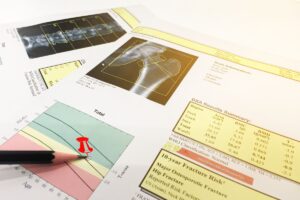
Osteoporosis 101: Know What To Look For and Foods That Can Help Prevent It
Osteoporosis is often undiagnosed and untreated in post-menopausal women+. It’s not curable, so prevent it with these foods and other lifestyle changes.

How Menopause Impacts Heart Health: 7 Action Steps That Help
Heart health lifestyle habits can help you manage menopause symptoms and help reduce the risk of cardiovascular disease.

Best Foods To Eat To Manage Restless Leg Syndrome (RLS)
Food as medicine. Get a list of the best foods to eat to manage restless leg syndrome (RLS) and avoid triggering it.

